Peony in Love Read online
Page 8
“Mengmei insists he brought Liniang back from the spirit world and that the two of them have married,” he said. “Outraged, Prefect Du orders Mengmei’s decapitation.”
The fragrance from the peony in his palm filled my head. I remembered all the things I wished I’d done last night. I picked up the willow sprig from the balustrade. Slowly I began to walk around him, speaking softly all the while, caressing him with my words.
“Will the story end sorrowfully?” I asked. “Everyone is brought to the imperial court to present their problems to the emperor.” I came full circle, stopped to glance up to his eyes, and then glided around him again, this time letting the willow leaves brush against his torso.
“Liniang is presented to her father,” he said gruffly, “but he can’t accept that she’s alive, not even when he’s looking at her.”
“In this way, the great Tang Xianzu illustrated how men can be limited by li.” I kept my voice low, knowing my poet would have to work hard to hear me. “When something so miraculous happens, people can’t be rational anymore.” He sighed and I smiled. “The Prefect insists that Liniang pass many tests—”
“She casts a shadow and leaves footprints when she walks under blossoming trees.”
“That’s right,” I whispered. “And she also answers questions about the Seven Emotions—joy, anger, grief, fear, love, hate, and desire.”
“Have you experienced these emotions yourself?”
I stopped before him. “Not all of them,” I admitted.
“Joy?” He brought the peony he’d been holding in his hand to my cheek.
“Just today when I woke up.”
“Anger?”
“I told you I’m not perfect,” I answered as he brought the petals along my jaw.
“Grief?”
“Every year on the anniversary of my grandmother’s death.”
“But you have not truly experienced it yourself,” he said, taking the blossom away from my face and letting it trail down my arm. “Fear?”
I thought of the fear I felt coming here, but I said, “Never.”
“Good.” He kept the peony against the inside of my wrist. “Love?” I didn’t answer, but the feel of the flower on my skin caused me to shiver, and he smiled. “Hate?”
I shook my head. We both knew I hadn’t lived long enough or seen enough to hate anyone.
“Only one left,” he said. He brought the peony back up along my arm and then pulled it away, to drop again to a spot just below my ear. Then he slowly let the blossom glide down across my neck to the top of my collar and forward to my throat. “Desire?”
I had stopped breathing.
“I see your answer in your face,” he said.
He brought his lips to my ear.
“If we married,” he whispered, “we would not have to waste time drinking tea and making conversation.” He stepped back and looked out across the lake. “I wish…” His voice quavered, which I saw embarrassed him. He felt this moment as deeply as I did. He cleared his throat and swallowed hard. When he next spoke, it was as though nothing had happened between us. I was loose again, on my own.
“I wish you could see my home. It’s just across the lake on Wushan Mountain.”
“Isn’t that it right there?” I asked, pointing to the hill on the other side of the lake.
“That is the hill, yes, but Solitary Island—as beautiful as it is—obstructs the view of the house. My home is just behind the tip of the island. I wish you could see it, so that you could look across the water and think of me.”
“Perhaps I’ll be able to see it from my father’s library.”
“You’re right! Your father and I have talked politics there many times. I can see my home from the windows. But even if you can see the mountain, how will you know which house is mine?”
My mind, in such a turbulent state, could not think clearly enough to come up with a possible solution.
“I’m going to show you the house, so you can find it. I promise to look out from there every day to find you, if you will look for me.”
I agreed. He led me to the right side of the pavilion near the shore. He took the willow sprig from my hand and put it together with the peony blossom on the balustrade. When he sat down next to them and swung his legs over the edge, I understood that he intended me to do the same. He jumped down, stood on a rock, and reached his arms up to me.
“Give me your hands.”
“I can’t.” And I truly couldn’t. I had done a lot of improper things this evening, but I wasn’t going to follow him. I’d never been outside the Chen Family Villa. On this one thing my mother and father were adamant.
“It’s not far.”
“I’ve never been beyond my garden. My mother says—”
“Mothers are important, but—”
“I can’t do this.”
“What about the promise you just made?”
My will wavered. I was as weak as my cousin Broom when presented with a plate of dumplings.
“You will not be the only girl—woman—outside a garden wall tonight. I know many women who are boating on the lake this evening.”
“Teahouse women.” I sniffed.
“Absolutely not,” he said. “I’m referring to women poets and writers who have joined poetry and writing clubs. Like you, they want to experience more of life than what is available inside their gardens. By leaving their inner chambers they’ve become artists of worth. It is this outside world that I would show you if you were my wife.”
He left unsaid that tonight was as far as that dream would go.
This time when he extended his arms, I sat down on the balustrade and, as delicately as possible, drew my legs across the stonework and let myself be pulled from the safety of the villa. He led me to the right along the rocks that lined the shore. What I was doing was beyond bad. Amazingly, nothing terrible happened. We weren’t caught, and no ghosts leaped from behind a bush or tree to scare or kill us for this infraction.
He held my elbow, since some of the rocks were slick with moss. I felt the heat of his hand through the silk of my sleeve. Warm air lifted my skirt as though it were a cicada’s wing carried by the wind. I was out. I was seeing things I’d never seen before. Here and there, bits of vines and branches draped over our compound wall, hinting at what was hidden inside. Weeping willows hung over the lake, their tendrils teasing the water’s surface. I brushed against wild roses blooming on the bank and their scent infused the air, my clothes, my hair, the skin on my hands. The feelings that rushed through my body were nearly overwhelming: fear that I would be caught, exhilaration that I was out, and love for the man who had brought me here.
We stopped. I wasn’t sure how long we’d been walking.
“My house is there,” he said, pointing across the lake, past the newly built pavilion on Solitary Island that I could see from my father’s library. “There’s a temple on the hill. It’s lit by torches this evening. Do you see it? The monks open their doors for all festivals. Just a little up and to the left is the house.”
“I see it.”
The moon was just a sliver, but it was enough to cast a path across the lake from my toes to his doorstep. It felt as though the heavens had agreed that we were meant to have this time together.
In this most extraordinary circumstance, I was distracted by a peculiar sensation. My lily shoes were thoroughly soaked and I could feel water being drawn up into the hem of my skirt. I took a tiny step back from the water’s edge, which sent ripples out across the peaceful surface. I thought about those ripples hitting the hulls of boats that carried other lovers on the lake and lapping at the edges of moon-viewing pavilions where young husbands and wives had sought refuge from the watchful eyes of the household.
“You’d like my home,” he said. “We have a nice garden—not as large as yours—with a small rockery, a moon-viewing pavilion, a pond, and a plum tree whose blossoms in spring fill the entire compound with an enticing fragrance. Whenever I see it,
I’ll think of you.”
I wished we would have a wedding night. I wished it would happen right now. I blushed and looked down. When I looked up, he stared into my eyes. I knew he longed for the same thing I did. And then the moment was over.
“We must return,” he said.
He tried to hurry us, but my shoes were now slippery and I was slow. As we got closer to the villa, the sounds of the opera came more fully into my consciousness. Mengmei’s pained cries as he was tortured and beaten by Prefect Du’s guards told me we were close to the end.
He lifted me up and back into the Moon-Viewing Pavilion. This was it. Tomorrow, I would go back to preparing for my marriage, and he would go back to whatever young men do to get ready to greet their wives.
“I liked talking to you about the opera,” he said.
They may not seem like the most romantic words a man could have spoken, but to me they were, for they showed that he cared for literature, the concerns of the inner chambers, and that he truly did want to know what I thought.
He picked up the willow sprig and handed it to me. “Keep this,” he said, “to remind you of me.”
“And the peony?”
“I’ll keep it forever.”
I smiled inwardly, knowing that the flower and I shared the same name.
He brought his lips close to mine, and when he spoke his voice trembled with emotion. “We had three nights of happiness. That’s more than most married couples have in a lifetime. I will remember them forever.”
As my eyes filled with tears, he said, “You must go back. I won’t leave here until there’s a safe distance between us.”
I bit my lip to keep from crying and turned away. I walked alone toward the main garden, stopping by the pond to tuck the willow sprig inside my tunic. Only when I heard Prefect Du accuse his daughter, who’d been brought before him, of being a disgusting creature of the dead did I remember how sullied my shoes, leggings, and the bottom of my skirt had become. I needed to get back to my room and change without being seen.
“Here you are,” Broom said, stepping out of the shadows. “Your mother sent me to look for you.”
“I was…I had to…” I thought of Willow that first night as she played the role of Spring Fragrance. “I had to use the chamber pot.”
My cousin smiled knowingly.
“I’ve been to your room. You weren’t there.”
Having caught me in a lie, Broom regarded me suspiciously. I watched her smile broaden as her eyes traveled from my face down across my torso to my skirt, my dirty hem, and my soiled shoes. She pasted a bright mask on her face, looped her arm affectionately through mine, and said in a pretty tone, “The opera is nearly finished. I don’t want you to miss the end.”
I was light-headed enough with my own private happiness to believe she wanted to help me. Whatever hidden strength had surfaced when I allowed myself to go over the balustrade of our Moon-Viewing Pavilion had retreated to a hidden corner deep inside me, because I didn’t break away from Broom and sit down on my cushion at the back of the audience but allowed myself to be led—helplessly, stupidly, but with the ridiculous invincibility that came with the bliss I felt—through the seated women, right past my mother, and on to the front row of cushions, where I was squeezed in between little Ze and my cousin. And because I was seated next to Ze, I found myself once more before the crack in the screen that allowed me to peek out to the stage.
I looked across the sea of black-haired men until I found my poet, sitting next to my father. After a few minutes, I forced myself to look away from him and to the stage, where the emperor tried to bring the two factions together. Proclamations were read; honors bestowed. There was great rejoicing for the two young lovers—a truly happy ending—and yet nothing had been or would ever be reconciled between Prefect Du and his daughter.
The men on the other side of the screen jumped to their feet with applause and whoops of appreciation. The women on our side nodded at the truth of this ending.
As he had on the first night, my father took the stage. He thanked everyone for coming to our meager home for our inadequate production. He thanked the visiting actors and those on our household staff who’d been pulled from their regular duties for the performance.
“This is a night of love and destiny,” he said. “We have seen how Liniang and Mengmei’s story has ended. And we know how the story of the Weaving Maid and the Cowherd will end later tonight. Now let us have a preview of another love story.”
Waaa! He was going to announce something about my marriage. My poet put his head down. He didn’t want to hear this either.
“Many of you know that I’m fortunate to have as my future son-in-law a good friend,” Baba said. “I have known Wu Ren for so long, he is like a son to me.”
As my father lifted his arm to point out the man I was to marry, I closed my eyes. Three days ago, I would have followed his gesture to get a glimpse of my future husband, but right now I couldn’t abandon the tender emotions swimming inside me. I wanted to hold on to them a little longer.
“I’m lucky Ren has such a love of words,” my father went on. “I’m not so lucky when he beats me in chess.”
The men laughed appreciatively as they were meant to. On our side of the screen, there was silence. I felt stares of disapproval and disdain from the women behind me driving into my back like daggers. I opened my eyes, peered to my right, and saw Ze staring through the crack in the screen, her mouth set in an alarmed oh. Then Ze quickly averted her gaze. My husband had to be really ugly, hideous.
“Many of you are guests tonight and have not met my daughter,” my father continued, “but I also have my whole family here and they’ve known Peony for her entire life.” He addressed my future husband, confiding in front of everyone, “I have no doubt she will be a good wife to you…except for one thing. Her name is not suitable. Your mother’s name is also Peony.”
My father looked out across the audience of men, but he spoke to us behind the screen. “From now on, we will call my daughter Tong—Same—for she is the same as your mother, my young friend.”
I shook my head in disbelief. Baba had just changed my name forever and ever. I was now Tong—a common Same—because of my mother-in-law, someone I had yet to meet but who would have control over me until the day she died. My father had done this without asking me, without even warning me. My poet was right. Three beautiful nights would have to sustain me for a lifetime. But this night was not over, and I refused to sink into despair just yet.
“Let this be a night of celebration,” my father announced. He signaled toward the screen where we women sat. Servants came to escort us back to the Lotus-Blooming Hall. I leaned on Willow’s arm for support and was prepared to let her guide me back to the women’s chambers, when my mother came to my side.
“It seems you are a chosen one tonight,” she said, but the graciousness of her words could not hide the disappointment in her voice. “Willow, allow me to take my daughter back to her room.” Willow let go of me and my mother took my arm in hers. How she managed to look so beautiful and delicate when her fingers were digging into my flesh through my silk tunic, I don’t know. The others parted, and let the head woman of the Chen Family Villa lead her one and only child back to the Lotus-Blooming Hall. The others trailed behind us, quiet as scarves floating on the wind. They didn’t know what I’d done, but clearly I’d been somewhere I shouldn’t have been because they could all see that my feet—those most private of a woman’s parts—were soiled.
I don’t know what caused me to look back, but I did. Little Ze was walking with Broom. My cousin had a trace of smugness and triumph at the corners of her mouth, but Ze was still too young and unsophisticated to hide her emotions. Her face was red, her jaw clenched, her whole body rigid with anger. I didn’t know why.
We reached the Lotus-Blooming Hall. My mother paused for a moment to tell the others to enjoy themselves; she would return in a few minutes. Then, without another word, she took me to my room
in the Unmarried Girls’ Hall, opened the door, and gently pushed me inside. After she closed the door, I heard something I’d never heard before. It sounded like metal scraping. Only when I tried to open the door again to see what it was did I realize that for the first time my mother had used one of her locks to confine me.
That Mama was angry with me didn’t change the words my poet had spoken in my ear, nor did they alter the feeling that still lingered on my flesh from where he had touched me with the peony. I brought out the willow sprig he’d given me and used it to caress my cheek. Then I put it in a drawer. I undressed my wet feet and wrapped them again in clean bindings. From my window, I did not see the celestial bridge that was supposed to unite the Weaving Maid and the Cowherd, but I did still smell the fragrance of wild roses in my hair and on my skin.
Closing Doors, Opening Heart
MAMA NEVER AGAIN MENTIONED THE WETNESS AND DIRT on my shoes, skirt, and leggings. A servant took those things away, they were never brought back, and I continued to be locked in my room. During the long weeks of my confinement, I would begin to question everything. But at first I was just a sad girl locked in her room with no one to talk to. Even Willow was barred, except to bring me meals and fresh water for washing.
I spent hours at my window, but my view was limited to a small patch of sky above and the courtyard below. I leafed through my copies of The Peony Pavilion. I sought out the scene of The Interrupted Dream, trying to decipher what Liniang and Mengmei were doing together in the grotto. At every moment, I thought about my stranger. The feelings that filled my chest dampened my appetite and emptied my head. I constantly brooded about how I would continue to hold on to my emotions once I got out of this room.
One morning, a week into my confinement, Willow opened the door, padded quietly across the floor, and set down a tray with tea and a bowl of congee for breakfast. I missed her company and the way she cared for me—brushing my hair, washing and wrapping my feet, keeping the air between us lively with conversation. These past days, she’d been very quiet when she brought my meals, but now she smiled in a way I’d never seen before.

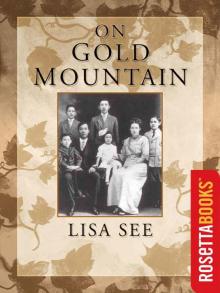 On Gold Mountain: The One-Hundred-Year Odyssey of My Chinese-American Family
On Gold Mountain: The One-Hundred-Year Odyssey of My Chinese-American Family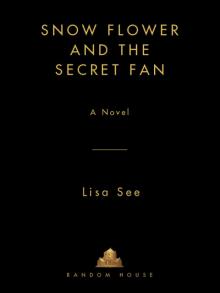 Snow Flower and the Secret Fan
Snow Flower and the Secret Fan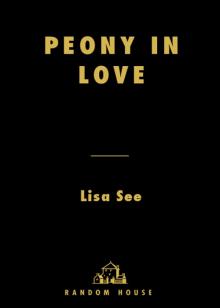 Peony in Love
Peony in Love Flower Net
Flower Net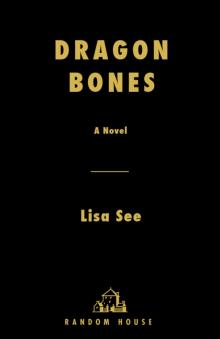 Dragon Bones
Dragon Bones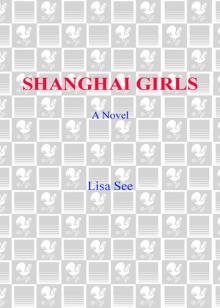 Shanghai Girls
Shanghai Girls Dreams of Joy
Dreams of Joy The Island of Sea Women
The Island of Sea Women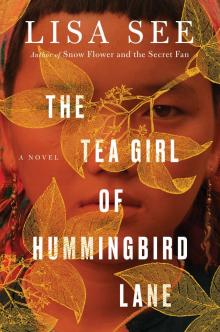 The Tea Girl of Hummingbird Lane
The Tea Girl of Hummingbird Lane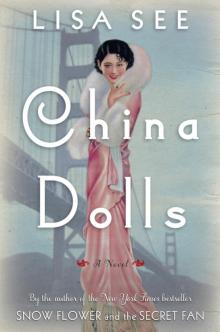 China Dolls
China Dolls The Interior
The Interior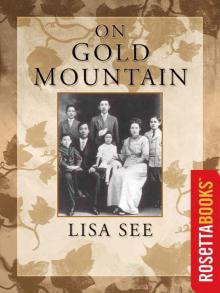 On Gold Mountain
On Gold Mountain